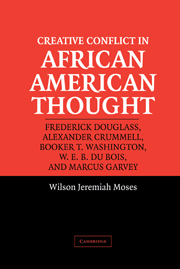Book contents
- Frontmatter
- Contents
- Acknowledgments
- Preface: Struggle, Challenge, and History
- 1 Introduction: Reality and Contradiction
- FREDERICK DOUGLASS: THE INDIVIDUALIST AS RACE MAN
- ALEXANDER CRUMMELL: THE ANGLOPHILE AS AFROCENTRIST
- 5 Alexander Crummell and Stoic African Elitism
- 6 Alexander Crummell and Southern Reconstruction
- 7 Crummell, Hero Worship, Du Bois, and Presentism
- BOOKER TALIAFERO WASHINGTON: THE IDEALIST AS MATERIALIST
- W. E. B. DU BOIS: THE DEMOCRAT AS AUTHORITARIAN
- MARCUS MOZIAH GARVEY: THE REALIST AS ROMANTIC
- CONCLUSION: RESCUING HEROES FROM THEIR ADMIRERS
- Index
5 - Alexander Crummell and Stoic African Elitism
Published online by Cambridge University Press: 07 November 2009
- Frontmatter
- Contents
- Acknowledgments
- Preface: Struggle, Challenge, and History
- 1 Introduction: Reality and Contradiction
- FREDERICK DOUGLASS: THE INDIVIDUALIST AS RACE MAN
- ALEXANDER CRUMMELL: THE ANGLOPHILE AS AFROCENTRIST
- 5 Alexander Crummell and Stoic African Elitism
- 6 Alexander Crummell and Southern Reconstruction
- 7 Crummell, Hero Worship, Du Bois, and Presentism
- BOOKER TALIAFERO WASHINGTON: THE IDEALIST AS MATERIALIST
- W. E. B. DU BOIS: THE DEMOCRAT AS AUTHORITARIAN
- MARCUS MOZIAH GARVEY: THE REALIST AS ROMANTIC
- CONCLUSION: RESCUING HEROES FROM THEIR ADMIRERS
- Index
Summary
Alexander Crummell was a man of many contradictions, but the most obvious of these was the apparent disharmony between his Anglophilism and his black nationalism. While this yoking together of presumable opposites made him peculiar, it did not make him unique. Crummell belonged to a trans-Atlantic class of educated Africans and African American intellectuals who realized that they could never be completely at home in any existing cultural setting. Distrusted by the African and Afro-American masses and rejected by English and Anglo-American elites, Crummell sought, as did other assimilated blacks in Africa and America, to create a universal African civilization movement. In his voluminous writings and orations, he persistently argued the need for authoritative institutions, intellectual elites, disciplined religion, and organized labor, and for the rule of law to curb the enthusiasms of unwashed mobs and the machinations of ambitious individuals.
Crummell believed that the essential traits of the native African personality embodied the highest universal values. He was a “civilizationist” who hoped the virile barbarians of indigenous Africa, infused with an elitist and disciplined Christianity, were destined to rival, and perhaps exceed, the accomplishments of Victorian civilization. Throughout his writings, a positive image of the pristine African is recurrent, contrasted with a negative image of the debased American Negro. As a so-called “free African,” born in New York in 1819, he had no direct exposure to plantation society, but he was convinced that Southern slave culture was a hopelessly debilitating artifact, contrived by the white race for the sole purpose of degrading the black.
- Type
- Chapter
- Information
- Creative Conflict in African American Thought , pp. 83 - 102Publisher: Cambridge University PressPrint publication year: 2004



